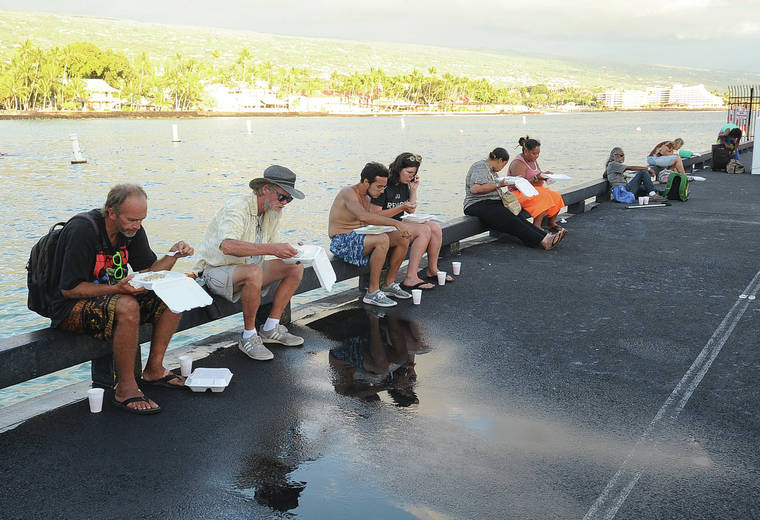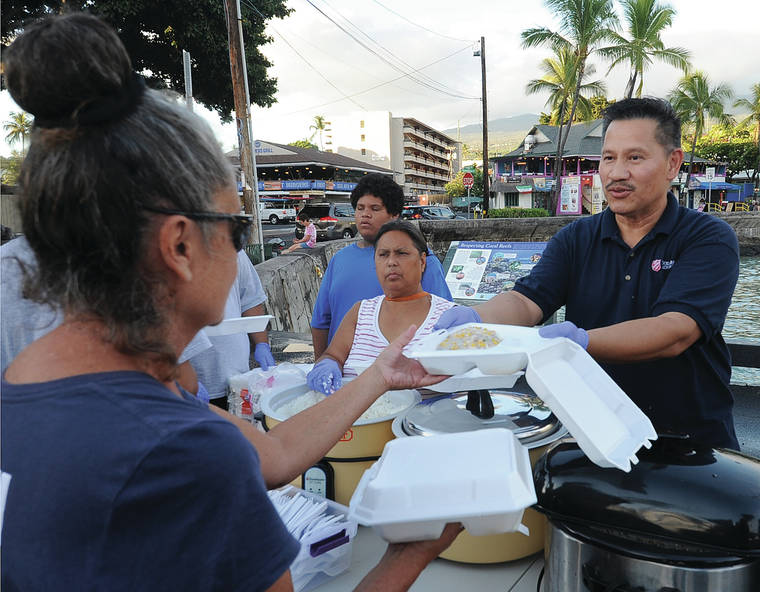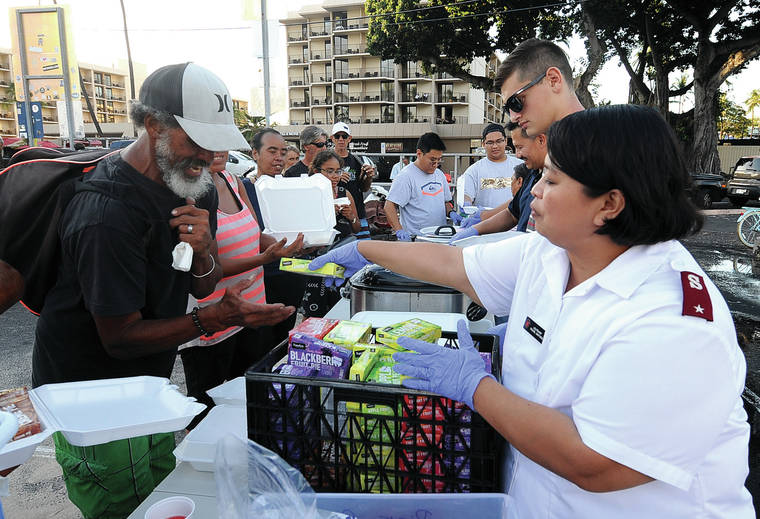KAILUA-KONA — Salvation Army Lt. Raghel Santiago and her husband, Lt. Jose Santiago, have spent every Thursday night since June 2017 exactly the same way.
They station themselves at Kailua Pier from 6-7 p.m. and open the evening with a brief devotion before hosting one of the largest free meals in West Hawaii. Last Thursday, the couple ladled beef goulash over rice with a side of pears, a pastry and juice for some 220 hungry mouths.
Theirs is a tradition verging on two years, and the poor and homeless communities know it. They rely on it, Santiago said. But the Thursday night feedings, a weekly Kailua Village staple since late June 2017, may soon become a thing of the past.
“We’ve been so consistent to be there every Thursday,” she said. “Whether there’s a storm or not, we’re there. … If all of the sudden we’re not there and people are coming there expecting that warm meal, what (happens)?”
The Santiagos were contacted via email on April 30 by Mark Phillips, port facility security officer at Kailua Pier with the Department of Land and Natural Resources Division of Boating and Ocean Recreation.
Phillips could not be reached for comment before press time Friday but outlined his position in the communication addressed to Raghel Santiago after acknowledging his predecessor had granted her and her husband permission to host the Thursday night feeds.
“… I have received numerous complaints from the hotel and the community regarding the Thursday night meals at this location,” Phillips wrote. “There is an increase in activity/traffic (commercial, canoe club, and swim team practices) and I have become a bit concerned with the meals being offered in this location.”
He went on to cite an incident on a Thursday during which youth paddlers waiting to be picked up witnessed a verbal altercation between two homeless men gathered for the meal, who then proceeded to “square off.” Phillips also mentioned several other instances of homeless misconduct occurring at different times on days of the week other than Thursday.
“I understand and appreciate the work that you and your volunteers are doing for the community,” Phillips’ email continued. “However, I am hoping that there may be an alternate location that could be utilized for these meals in the future to alleviate these concerns?”
Inde Coggins, owner of Splashers Grill located across Alii Drive from the pier, said she didn’t feel the presence of homeless on Thursdays was costing her business. But she acknowledged the feedings aren’t absent complications.
“It does draw more homeless to the area, then we have that uptick of them coming into the restaurants, (ordering without paying), then walking out,” she said.
“I think it would be more beneficial if it wasn’t directly in front of the hotel,” Coggins continued. “I don’t know if it’s the best representation of our community. I think it’s a necessary thing, but I think there’s a better location, particularly if we had an indoor location … not right here in the heart of the village.”
Santiago said the discussions she’s had with DOBOR have been cordial, but she took umbrage with some of Phillips’ assertions and implications.
It’s not just transients who stand in the chow line at the pier, she said, but also the less fortunate and even some tourists.
She and her husband make it clear to regulars how important it is they remain orderly and in compliance so the feedings can continue, which includes a ban on alcohol, drugs and tobacco during the dinner hour.
In all her time hosting the feedings, Santiago can recall only one disturbance coming from the crowd. It was one intoxicated woman, she remembered, and the crowd policed itself by forcing the disruptive element to vacate the area.
Instances happening on different days that aren’t related to the Thursday night dinners shouldn’t reflect in any manner on the work the Salvation Army is doing, Santiago contended, adding that something negative happening because of homeless presence at the pier on a Monday or a Saturday has nothing to do with inviting hungry people for a meal on a Thursday night.
“Should everybody be marginalized just because someone did this dumb thing (at some other time)?” she asked. “Should no one be able to have a warm meal anymore?”
The Santiagos are diligent about trash pickup, passing around bags throughout the dinner hour and staying until the last person has gone to make sure the area is left the way it was found, she said.
Finally, Santiago believes there’s as much positive commentary as critical response to the feedings — it’s just that people tend focus too greatly on the negative. She said locals and tourists alike often come up to her and her husband, thanking them for what they’re doing or even donating money for the next week.
The couple started the program with money from their own collective pocket, feeding 30-40 per evening. Since then, donations have swelled and the feeding has grown large enough to accommodate hundreds.
Santiago says she and Jose are looking for other venue options to try and work with Phillips, but haven’t been able to find any. They plan to head back to the pier next Thursday and for the foreseeable future. But she’s afraid of what might happen if the program is eventually forced off Alii Drive.
“I honestly don’t know what to do at this point,” Santiago said.













